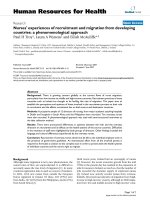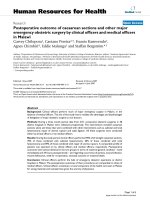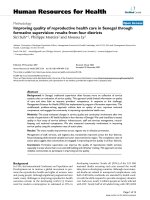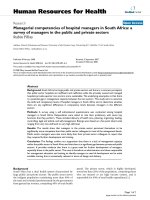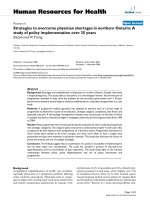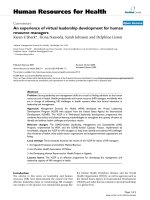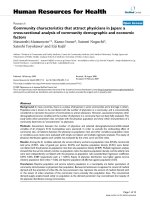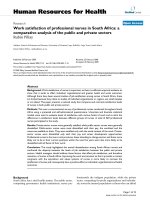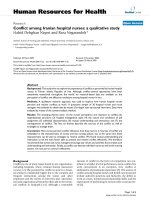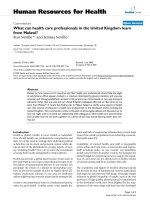báo cáo sinh học:" Managerial competencies of hospital managers in South Africa: a survey of managers in the public and private sectors" docx
Bạn đang xem bản rút gọn của tài liệu. Xem và tải ngay bản đầy đủ của tài liệu tại đây (215.33 KB, 7 trang )
BioMed Central
Page 1 of 7
(page number not for citation purposes)
Human Resources for Health
Open Access
Research
Managerial competencies of hospital managers in South Africa: a
survey of managers in the public and private sectors
Rubin Pillay
Address: School of Business and Finance, University of the Western Cape, Private Bag X17, Bellville, 7535, South Africa
Email: Rubin Pillay -
Abstract
Background: South Africa has large public and private sectors and there is a common perception
that public sector hospitals are inefficient and ineffective while the privately owned and managed
hospitals provide superior care and are more sustainable. The underlying assumption is that there
is a potential gap in management capacity between the two sectors. This study aims to ascertain
the skills and competency levels of hospital managers in South Africa and to determine whether
there are any significant differences in competency levels between managers in the different
sectors.
Methods: A survey using a self administered questionnaire was conducted among hospital
managers in South Africa. Respondents were asked to rate their proficiency with seven key
functions that they perform. These included delivery of health care, planning, organizing, leading,
controlling, legal and ethical, and self-management. Ratings were based on a five point Likert scale
ranging from very low skill level to very high skill level.
Results: The results show that managers in the private sector perceived themselves to be
significantly more competent than their public sector colleagues in most of the management facets.
Public sector managers were also more likely than their private sector colleagues to report that
they required further development and training.
Conclusion: The findings confirm our supposition that there is a lack of management capacity
within the public sector in South Africa and that there is a significant gap between private and public
sectors. It provides evidence that there is a great need for further development of managers,
especially those in the public sector. The onus is therefore on administrators and those responsible
for management education and training to identify managers in need of development and to make
available training that is contextually relevant in terms of design and delivery.
Background
South Africa has a dual health system characterized by
large public and private sectors. The public sector serves
the indigent population constituting more than 80% of
the total and is funded predominantly by the government
from general tax revenue, comprising 40% of total health
spend. The private sector, which is highly developed,
serves less than 20% of the population, comprising those
who are insured or are high income earners, and is
responsible for 60% of total health expenditure [1].
Published: 8 February 2008
Human Resources for Health 2008, 6:4 doi:10.1186/1478-4491-6-4
Received: 3 September 2007
Accepted: 8 February 2008
This article is available from: />© 2008 Pillay; licensee BioMed Central Ltd.
This is an Open Access article distributed under the terms of the Creative Commons Attribution License ( />),
which permits unrestricted use, distribution, and reproduction in any medium, provided the original work is properly cited.
Human Resources for Health 2008, 6:4 />Page 2 of 7
(page number not for citation purposes)
Hospitals in South Africa reflect the stark contrast between
health service provision in the public and the private sec-
tors. The government owned and managed public sector
hospitals are often characterized as being inefficient and
ineffective as evidenced by anecdotes of patient dissatis-
faction and disaffections, and personal observation [2-4].
In contrast, the privately owned and managed hospitals
are amongst the more profitable of enterprises and com-
pare favourably with the best in the world, as evidenced
by constantly rising share prices and the growth in medi-
cal tourism. In an attempt to improve public sentiment
about the public sector, and in their quest to enhance effi-
ciency and effectiveness within the sector, public sector
agencies are aspiring to emulate the private sector philos-
ophy and management approach. The underlying
assumption is that there is a potential gap in management
capacity between the two sectors. This study aims to ascer-
tain the skills and competency levels of hospital managers
in South Africa as determined by self assessment, and to
find out whether there are any significant differences in
proficiency levels between managers in the different sec-
tors. The findings will therefore be useful in all countries
where national health systems are making the transition
to a more businesslike approach to service delivery.
All managers, irrespective of where or what they manage,
perform four generic tasks. These include planning, organ-
izing, leading and controlling. Planning involves defining
goals and mapping out ways to reach them; organizing
entails arranging and coordinating human, material and
information resources aimed at achieving desired goals;
leading involves motivating others to achieve organiza-
tional goals and controlling involves measuring perform-
ance and monitoring progress relative to objectives [5].
Managers need to possess several competencies that will
enable them to perform these functions effectively and
efficiently. Managerial competencies are 'sets of knowl-
edge, skills, behaviours, and attitudes that a person needs
to be effective in a wide range of managerial jobs and var-
ious types of organizations' [6]. Of particular importance
are strategic skills which relate to setting of key objectives
based on an understanding of what is happening inside
and outside the organization; task related skills which
encompass functional and operational competencies
which enable one to define the best approach to achieving
objectives, given the resources available; people related
skills which enable one to achieve objectives through and
with others; and self-management skills which enable one
to take responsibility for one's life at work and beyond.
The field of health care management, however, poses
unique challenges as managers are expected to integrate
modern business management practices with clinical and
healthcare knowledge.
The American College of Preventive Medicine, after can-
vassing a broad audience of clinicians, educationists and
health management experts, defined a list of health man-
agement competencies and performance indicators to
assist in the development of training programs in medical
management. These related to the delivery of health care,
financial management, organizational management, and
legal and ethical considerations [7]. In a survey of Ameri-
can medical directors, competencies related specifically to
health care, including clinical preventive skills, were rated
highly relative to generic management competencies, sug-
gesting that a health background or specialized training in
health care management may be essential for the effective
management of health service organizations [8]. Similar
studies in the UK, also identified financial, medical and
people related skills as the most important for inclusion
in management development programs for hospital man-
agers [9,10].
Although health managers are key to overcoming the chal-
lenges facing health delivery in South Africa, there has
been very little formal evaluation of the capacity of hospi-
tal managers, as well as their needs for future training, in
South Africa. Schaay [11] emphasised the importance of
determining the level of current management capacity
and training required as part of an overall management
development process in our quest to improve policy
implementation and health systems functioning. This
paper aims to evaluate hospital managers' perceptions
about their developed abilities for their current role as
well as their needs for further training in health care man-
agement. In addition it compares and contrasts the per-
ceptions of hospital managers in the public sector with
those in the private sector regarding these competencies
and needs. It is hoped that the information gleaned will
help in conceptualization, design and delivery of appro-
priate and relevant programs aimed at enhancing manage-
ment and leadership capacity in the health sector in South
Africa.
Methods
Data for this study come from a survey of hospital manag-
ers in the public and private sectors in South Africa, using
a self administered questionnaire. The survey was con-
ducted among all managers of public hospitals in six of
the nine provinces in South Africa (3 provinces did not
respond to the call to participate) and all managers of pri-
vate hospitals registered with the Hospital Association of
South Africa, who represent 94% of private hospitals in
the country. The final sample comprised 215 public sector
managers and 189 private sector managers.
The survey instrument comprised a specially developed
and pre-tested questionnaire that included biographic
and institutional characteristics, professional background
Human Resources for Health 2008, 6:4 />Page 3 of 7
(page number not for citation purposes)
and exposure to health management training. Likert-type
scales ranging from 1 (very poor) to 5 (excellent) and
comprising multiple items, were used to rate their percep-
tions of their competency levels with seven key functions
that they perform, as well as their needs for further train-
ing and development. These included specific health care
competencies, planning, organizing, leading, controlling,
legal and ethical, and self-management. These competen-
cies were derived from the literature [[5-9], and [10]] thus
ensuring content validity. They were found to exhibit high
internal consistencies in their respective studies, thus
ensuring the reliability of the instrument. Several other
stakeholders with an interest in hospital management
were asked to evaluate the relevance of the questionnaire
to the proposed study objectives, thus establishing face
validity.
Questionnaires were mailed in September 2006 and non-
responders were sent questionnaires four weeks later.
Data collection was terminated six weeks after the final
mailing. The results of a sample of primary non-respond-
ers were compared to that of the primary responders to
assess non-response bias. Data for individual variables
were summarized using frequency distributions and
focused on the central tendency (mean) and the disper-
sion (standard deviation). The ultimate score that each
manager received for each of the seven factors was calcu-
lated from the mean of the summed items for that varia-
ble. This allows one to treat the data as interval data
measuring a latent variable, to which parametric statistical
tests can be applied. Reliability of scales was estimated by
assessing the internal consistency of the scales using Cron-
bach's Alpha. Relationships between variables were ana-
lyzed using chi-squared tests for categorical variables. For
quantifiable variables, the non-parametric Mann-Whitney
was used for test for single item scales, and parametric
analysis of variance (ANOVA) for responses that were
summed to create a factor. All analyses were conducted at
a 95% level of certainty and allowing for a margin of error
of 5%.
Results
Questionnaires were returned from 116 of 210 valid
addresses of public sector managers and 87 of 179 valid
addresses of private sector managers. This represents a
total response rate of 51.91% and a response rate of
55.23% and 48.60% from the public and private sectors,
respectively. There were no significant differences
between primary respondents and the sample of primary
non-respondents in terms of demographics, institutional
characteristics and the self-evaluation of competency lev-
els
As shown in Table 1, most public sector respondents were
male (53.9%), between the ages of 35 to 50 (52.6%) and
have been in their current positions for less than 5 years
(50.4%). Private sector respondents were also predomi-
nantly male (62.1%) and between the ages of 35 and 50
(68.6%), but the majority (67.4%) have been in their
positions for more than 5 years.
Most public sector managers had a medical/health related
background (55.3%) while the majority of managers in
the private sector had a commerce/management or some
other background (67.2%). Formal training in health
management, in the form of a certificate, diploma or
degree was higher among public sector managers
(74.8%), relative to their private sector colleagues
(41.9%). Both groups reported equally high levels of
informal training in health management (around 90%).
These included mentoring, in-service training and non-
certified programs.
Bivariate analyses between the sectors and other categori-
cal variables show significant associations between the
sectors and age, experience, professional background, for-
mal training in health management and the intention of
respondents to attend future training programs in health
care management (Table 2).
Public sector managers were more likely to be older than
50 years than their colleagues in the private sector
(p 0.008). Managers in the public sector were also signifi-
cantly more likely to have less than five years experience
while their private sector colleagues were more likely to
have over five years experience
(p 0.017). Private sector managers were also more likely
to have a commerce or management background while
those in the public sector were more likely to have a
health or medical background (p 0.000). Private sector
managers were also significantly less likely to have had
any formal training in health care management than their
public sector colleagues (p 0.000) and were also less likely
to be seeking any training in health management within
the next five years (p 0.001).
The Cronbach's alpha and the mean total scores for the
management competency subscales are presented in Table
3 below. The Cronbach's alphas for all the scales are at an
acceptable level of reliability, averaging 0.845.
As a group, hospital managers in South Africa perceive
themselves as at least reasonably competent in all facets of
their management functions (means > 3). They did how-
ever feel relatively more competent in their ability to plan
(4.14), manage themselves (4.04) and lead (4.02) whilst
feeling least competent in the specific health care skills
(3.44).
Human Resources for Health 2008, 6:4 />Page 4 of 7
(page number not for citation purposes)
Public sector managers reported that they felt most com-
petent in planning (3.96), self management (3.95) and
leading(3.91) and least competent in terms of legal/ethi-
cal competencies (3.59) and their specific health care
skills (3.59). Private sector managers rated themselves
highest in planning(4.30), followed by organizing(4.18),
leading (4.16), self management (4.16) and controlling
(4.14). They rated themselves as being least competent in
legal/ethical skills (3.77) and their specific health care
skills (3.21).
In total, 94.9% of public sector managers and 80.5% of
private sector managers agreed with the statement that
they "need further management development", suggest-
ing that, on average, hospital managers felt that they could
benefit from further training. The Mann-Whitney test
revealed that public sector managers were also signifi-
Table 1: Respondent Characteristic (Count and valid percentages)
PUBLIC PRIVATE
RESPONSE RATE 116(55.23) 87(48.60%)
Gender (N = 202)
Male 62 (53.9%) 54 (62.1%)
Female 53 (46.1%) 33(37.9%)
Total 115 87
Age (N = 200)
< 35 3 (2.7%) 6 (7.0%)
35–50 60 (52.6%) 59 (68.6%)
>50 51 (44.7%) 21 (24.4%)
Total 114 86
Years In Current Position (N = 200)
<5 57 (50.5%) 28 (32.2%)
5–10 31 (27.4%) 39 (44.8%)
>10 25 (22.1%) 20 (23%)
Total 113 87
Primary Formal Qualification (N = 195)
Medical/Health related 63 (55.3%) 28 (34.6%)
Commerce/General Management 14 (12.3%) 40 (49.4%)
Health Care Management 16 (14%) 1 (1.2%)
More than 1 of above 3 20 (17.5%) 6 (7.4%)
Other 1 (0.9%) 6 (7.4%)
Total 114 81
Formal Training In Health Management(N =
201)
Yes 86 (74.8%) 36 (41.9%)
No 29 (25.2%) 50 (58.1%)
Total 115 86
Informal Training In Health Management (N =
202)
Yes 108 (93.1) 77 (89.7%)
No 8 (6.9%) 9 (10.3%)
Total 116 86
Table 2: Bivariate Relationship between Sectors and Respondent Biographic and Training Characteristics (Chi-square)
Other Biographics Pearson Chi-squared df Significance
Gender 1.348 1 0.246
Age 9.780 2 0.008
Number of years in currency position 8.121 2 0.017
Primary formal qualification 41.916 4 0.000
Formal training 22.355 1 0.000
Informal training 1.492 2 0.474
Intention for further training 10.930 1 0.001
Human Resources for Health 2008, 6:4 />Page 5 of 7
(page number not for citation purposes)
cantly more likely to report that they required further
development and training than their private sector col-
leagues (Z = -6.441; p 0.00)
Parametric ANOVA revealed significant differences
between the sectors and all of the management compe-
tency variables as well as the 'need for management devel-
opment' (See Table 4).
Managers in the private sector perceived themselves to be
significantly more competent than their public sector col-
leagues in all of the factors except for the "delivery of
health care" where public sector managers felt more com-
petent (p 0.009).
Discussion
Our response rate, though modest, is good given that
response rates in studies of professionals using self-
administered questionnaires are generally poor [12,13].
This may indicate that managers attach a high degree of
importance to medical management and the need for
management development. The similarity in responses
between respondents and a sample of primary non-
responders suggests that non response bias was minimal
and the sample was therefore representative of all hospital
managers in South Africa.
The professional background of the respondents suggests
that there is a perceptible shift in the leadership of hospi-
tals in South Africa towards general managers with a back-
ground in commerce or management. Historically, all
Table 3: Reliability of Management Competency and Need for Further Training Sub-Scales
N of Items Cronbach's Alpha Mean total score
Competency Variables
Specific health care skills 9 0.854 3.44
Planning 5 0.906 4.14
Organizing 7 0.865 3.90
Leading 6 0.888 4.02
Control 6 0.829 3.90
Legal and ethical issues 4 0.772 3.67
Self Management 6 0.801 4.04
Table 4: Bivariate Relationship between Sectors and Management Competency and Need for Further Training Variables (ANOVA)
NMean F Sig.
Competency Variables
Specific Health Care skills Public Sector 111 3.59 19.859 0.000
Private Sector 73 3.21
Total 184 3.44
Planning Public Sector 115 3.96 18.306 0.000
Private Sector 85 4.30
Total 200 4.11
Organizing Public Sector 111 3.69 42.294 0.000
Private Sector 84 4.18
Total 195 3.90
Leading Public Sector 114 3.91 10.910 0.001
Private Sector 86 4.16
Total 200 4.02
Control Public Sector 116 3.72 34.621 0.000
Private Sector 81 4.14
Total 197 3.89
Legal and Ethical Issues Public Sector 113 3.59 5.191 0.024
Private Sector 87 3.77
Total 200 3.67
Self Management Public Sector 116 3.95 8.400 0.004
Private Sector 87 4.16
Total 203 4.04
Human Resources for Health 2008, 6:4 />Page 6 of 7
(page number not for citation purposes)
hospitals, especially in the public sector, were managed by
medical superintendents and this shift is in keeping with
a strategy aimed at improvement of sustainable and effec-
tive delivery of health services by strengthening manage-
ment capacity [14]. However, although it is
understandable in terms of the government's transforma-
tion policy, it is of concern that the majority of public sec-
tor managers are vastly inexperienced, having been in
management positions for less than five years. In addi-
tion, the fact that public sector managers were signifi-
cantly more likely to be over 50 years of age has
implications in terms of the natural attrition and the
replacement of these managers and on the return on
investment from the development of these managers. The
future sustainability and stability of public sector institu-
tions will therefore depend not only on enhancing current
management capacity, but also on the development of
individuals with management potential as part of a
broader career management and succession planning ini-
tiative.
The fact that public sector managers have rated themselves
as at least "reasonably competent but not good" in all of
the competencies suggests that they lack confidence in
their ability either because they don't possess the requisite
management skills or because they more generally lack
self-belief. Either way, this is a potential hindrance to the
reconceptualisation of the public sector into a more cus-
tomer-oriented service and suggests that public sector
managers need more training in management skills. In
contrast their private sector colleagues have rated them-
selves as being "good to very good" in most of the compe-
tencies – especially those that relate to the core
management functions of planning, organizing, leading,
controlling and self-management. This suggests greater
self confidence and perceived ability, which augurs well
for the effective and efficient management of institutions
in this sector.
The fact that there is a significant gap in competency levels
of managers between the different sectors, with private
sector managers rating themselves significantly higher on
all of the competencies except for health services delivery,
may partly explain the differences in performance
between the sectors. This may be partly attributed to the
predominance of managers with a management back-
ground in the private sector. Hospital managers are of the
opinion that a management background is more appro-
priate for hospital management and those with a back-
ground in management tended to rate themselves as being
more competent than their colleagues who had a clinical
background [15]. The fact that private sector managers
tended to be more experienced may also contribute to
their perceived greater competency.
It is however of concern that despite public sector manag-
ers reporting that they were significantly more likely to
have attended formal training in health management,
they rated themselves significantly lower than private sec-
tor managers, and generally as being only "reasonably
competent but not good" in all of the competencies. It is
therefore reasonable to infer that formal programs cur-
rently in existence are either inappropriate or do not fully
meet the needs of hospital managers in the public sector.
This may also partly explain why they were significantly
more likely to report that they were unprepared for their
current responsibilities and were more likely to want to
seek further training in management. This supports the
finding of Pillay [15], that formal management develop-
ment programs did not significantly enhance competency
levels of health managers. Instead they appeared to derive
greater benefit from more informal approaches which
include mentoring, coaching and in-house approaches.
It is important to note that ranking of these competencies
by managers was purely subjective and based on a self-
assessment, which was not externally validated. It may
have been influenced by the respondents lack of knowl-
edge with the topic and therefore a lack of confidence in
being able to rate the items, or it may have been based on
a self-evident knowledge gap. The competencies listed
may also not have fully reflected the scope of hospital
management. However, despite these limitations, the
study has important theoretical and practical relevance for
the improvement of health management capacity in
South Africa.
Conclusion
In conclusion, the findings confirm our supposition that
there is a lack of management capacity within the public
sector in South Africa and that there is a significant gap
between private and public sectors. It provides the evi-
dence that there is a great need for the further develop-
ment of managers, especially those in the public sector.
The onus is therefore on administrators and those respon-
sible for management education and training to identify
managers in need of development and to make available
training that is contextually relevant in terms of program
design and delivery.
Acknowledgements
Francella Benyah (For assisting with the logistics of the survey).
Li Yang (For assisting with the statistical analysis).
References
1. Health Systems Trust: South African Health Review 2000.
2. Health-e (2006) [
]
3. Lehmannn U: Investigating the roles and functions of clinic
supervisors in the Eastern Cape Province. In HST Technical
Report Health Systems Trust. Durban; 2002.
4. Leon N, Bhunu F, Kenyon C, 'Voices of facility managers', Msailelka T,
Molefakgotla P, Visser R: 'Voices of district managers'. In South
Publish with Bio Med Central and every
scientist can read your work free of charge
"BioMed Central will be the most significant development for
disseminating the results of biomedical research in our lifetime."
Sir Paul Nurse, Cancer Research UK
Your research papers will be:
available free of charge to the entire biomedical community
peer reviewed and published immediately upon acceptance
cited in PubMed and archived on PubMed Central
yours — you keep the copyright
Submit your manuscript here:
/>BioMedcentral
Human Resources for Health 2008, 6:4 />Page 7 of 7
(page number not for citation purposes)
African Health Review Edited by: Ntuli A, Suleiman F, Barron P, McCoy
D. Health Systems Trust. Durban; 2001.
5. Lussier RN: Management fundamentals: Concepts, Applications, Skills
Development 3rd edition. Thomson South-Western: United States of
America; 2006.
6. Hellriegel D, Jackson ES, Slocum J, Staude G, Amos T, Klopper HB,
Louw L, Oosthuizen T: Management 2nd edition. Oxford University
Press: South Africa; 2004.
7. Lane D, Ross V: 'Declining competencies and performance
indicators for physician in medical management'. American
journal of preventive medicine 1998, 3(14):.
8. Halbert RJ, Bokor A, Parkinson MD, Lewis CE: 'Competencies for
Population-Based Clinical Managers: A survey of Managed
Health Care Medical Directors'. American Journal of Preventive
Medicine 1998, 1(15):.
9. Mahmood R, Chisnell C: 'Do doctors want to become involved
in management?'. Clinicians in Management 1993, 4(2):12-3.
10. Walker R, Morgan P: 'Involving doctors in Management – a sur-
vey of Management Development Career Needs of selected
doctors in NHS Wales'. Journal of Management in Medicine 1996,
1(10):31-52.
11. Schaay N, Heywood A, Lehmann U: 'A Review of Health Manage-
ment Training in the Public Health Sector in South Africa'.
In Technical Report to Chapter 9 of the 1998 SA Health Review Health
Systems Trust; 1998.
12. Hill CA, Winfery KL: 'Incentives and Response Rates: A Classic
experience with physicians'. American Association for Public
Opinion Research. Salt Lake City; 1996.
13. Sorbal J, De Forge BR, Ferentz HL: Physicians responses to fee-
for-service and capitation payment. Inquiry 1990, 29:416-425.
14. Department of Health: Human Resources for Health: A
National Human Resources Plan for Health to provide
skilled human resources for healthcare adequate to take
care of all South Africans. 2006 [ />cuss-f.html]. (Accessed 4/2/2007)
15. Pillay R: Does the professional background and management
training of hospital managers' really matter? 2007 in press.
